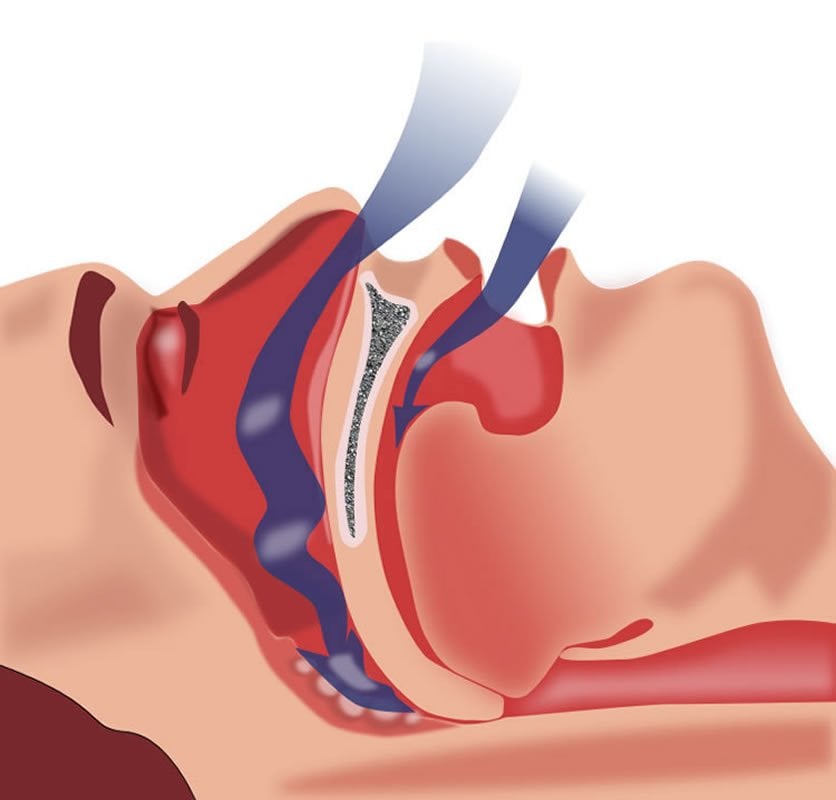Summary: CPAP helps to reduce symptoms of depression in patients with obstructive sleep apnea and cardiovascular disease independently of sleep improvements.
Source: Flinders University
Researchers have found that continuous positive airway pressure (CPAP) treatment of obstructive sleep apnea (OSA) can improve depression symptoms in patients suffering from cardiovascular diseases.
Using data from the Sleep Apnea Cardiovascular Endpoints (SAVE) trial led by Flinders University, the new study has found a significant decrease in cases of depression after patients received CPAP treatment for their sleep apnea.
This is by far the largest trial of its type and one of very few studies reporting such an effect, says Professor Doug McEvoy from Flinders University.
From a detailed analysis of the SAVE data, Flinders University experts and collaborators at the George Institute have found that CPAP for moderate-severe OSA in patients with cardiovascular disease has broader benefits in terms of preventing depression, independent of improved sleepiness.
Prior studies investigating the effect of CPAP on mood with various experimental designs and length of follow-up periods have yielded heterogeneous results.
“Patients who have had a stroke or heart attack are prone to suffer from low mood and are 2 to 3 times more likely to develop clinical depression, which then further elevates their risk of future heart attacks and strokes,” says SAVE principal investigator Professor McEvoy, a senior author in the paper just published by The Lancet in EClinicalMedicine.
With up to 50% of patients with CV disease likely to have OSA, the study is “welcome news that treatment of OSA substantially relieves cardiovascular patients’ depressive symptoms and improves their wellbeing”.
The paper’s first author, Dr Danni Zheng, from the George Institute for Global Health (UNSW), says the 2687 OSA patients enrolled in the SAVE trial were based solely on their history of cardiovascular disease and not on their current mood status.

“After following them for an average of 3.7 years, we found that CPAP provided significant reductions in depression symptoms compared with those who were not treated for OSA. The improvement for depression was apparent within six months and was sustained.”
As expected, those with lower mood scores to start with appeared to get the greatest benefit.
“Our additional systematic review which combined the SAVE study findings with previous work provided further support of the treatment effect of CPAP for depression,” Dr Zheng says.
Source:
Flinders University
Media Contacts:
Doug McEvoy – Flinders University
Image Source:
The image is in the public domain.
Original Research: Open access
“Effects of continuous positive airway pressure on depression and anxiety symptoms in patients with obstructive sleep apnoea: results from the sleep apnoea cardiovascular Endpoint randomised trial and meta-analysis”. Doug McEvoy.
EClinicalMedicine. doi:10.1016/j.eclinm.2019.05.012
Abstract
Effects of continuous positive airway pressure on depression and anxiety symptoms in patients with obstructive sleep apnoea: results from the sleep apnoea cardiovascular Endpoint randomised trial and meta-analysis
Background
Whether continuous positive airway pressure (CPAP) treatment can improve depression or anxiety symptoms in obstructive sleep apnoea (OSA) patients remains uncertain.
Methods
Secondary analysis of the Sleep Apnea Cardiovascular Endpoints (SAVE) trial, combined with a systematic review of randomised evidence. The SAVE secondary analyses involved 2410 patients with co-existing moderate–severe OSA and established cardiovascular disease randomly allocated to CPAP treatment plus usual care or usual care alone and followed up for 3·7 (SD 1·6) years. We evaluated the effect of CPAP treatment on depression and anxiety caseness (scores ≥ 8 on the Hospital Anxiety and Depression Scale depression and anxiety subscales [HADS-D and HADS-A]) for OSA patients.
Findings
CPAP treatment was associated with reduced odds of depression caseness (adjusted odds ratio [OR] 0·80, 95% confidence interval [CI] 0·65–0·98, P = 0·031) compared to usual care in the SAVE trial and the treatment effect was greater in those with pre-existing depression symptoms. A systematic review of 20 randomised trials including 4255 participants confirmed a benefit of CPAP in reducing depression symptoms in OSA patients: the overall effect (standardised mean difference) was − 0·18 (95% CI − 0·24 to − 0·12). No effect of CPAP treatment on anxiety caseness was found both in patients of the SAVE study (adjusted OR 0·98, 95% CI 0·78–1·24, P = 0·89) and the systematic review.
Interpretation
CPAP reduces depression symptoms in patients with co-existing OSA and CVD independently of improvements in sleepiness.






